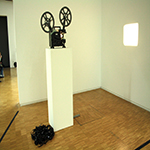Euroacademia Conferences
 Europe Inside-Out: Europe and Europeanness Exposed to Plural Observers (9th Edition) April 24 - 25, 2020
Europe Inside-Out: Europe and Europeanness Exposed to Plural Observers (9th Edition) April 24 - 25, 2020 Identities and Identifications: Politicized Uses of Collective Identities (9th Edition) June 12 - 13, 2020
Identities and Identifications: Politicized Uses of Collective Identities (9th Edition) June 12 - 13, 2020 8th Forum of Critical Studies: Asking Big Questions Again January 24 - 25, 2020
8th Forum of Critical Studies: Asking Big Questions Again January 24 - 25, 2020 Re-Inventing Eastern Europe (7th Edition) December 13 - 14, 2019
Re-Inventing Eastern Europe (7th Edition) December 13 - 14, 2019 The European Union and the Politicization of Europe (8th Edition) October 25 - 26, 2019
The European Union and the Politicization of Europe (8th Edition) October 25 - 26, 2019 Identities and Identifications: Politicized Uses of Collective Identities (8th Edition) June 28 - 29, 2019
Identities and Identifications: Politicized Uses of Collective Identities (8th Edition) June 28 - 29, 2019 The European Union and the Politicization of Europe (7th Edition) January 25 - 26, 2019
The European Union and the Politicization of Europe (7th Edition) January 25 - 26, 2019 7th Forum of Critical Studies: Asking Big Questions Again November 23 - 24, 2018
7th Forum of Critical Studies: Asking Big Questions Again November 23 - 24, 2018 Europe Inside-Out: Europe and Europeanness Exposed to Plural Observers (8th Edition) September 28 - 30, 2018
Europe Inside-Out: Europe and Europeanness Exposed to Plural Observers (8th Edition) September 28 - 30, 2018 Identities and Identifications: Politicized Uses of Collective Identities (7th Edition) June 14 - 15, 2018
Identities and Identifications: Politicized Uses of Collective Identities (7th Edition) June 14 - 15, 2018
‘Cultural Anti-Imperialism’: The Influence of American Underground Comics in Britain 1966 – 1980
-
-

-
Presentation speakers
- David Huxley, Manchester Metropolitan University, UK
- Download presentation
Abstract:
As there was an increasingly disenchanted response to the Vietnam War by the ‘counterculture’ in the USA in the 1960s, the role of graphics and particularly comics, became central to the identity of that counterculture. Yet comic artists like Robert Crumb and Gilbert Shelton, and poster/comic artists like Victor Moscoso were also hugely influential in Britain. This paper will look at key British underground magazines , such as Oz and International Times, which first reprinted American underground artists, This led on to the most famous British underground comics of the 1970s, the London-based Cozmic Comics and Nasty Tales, which featured both British and American material, andthere were then many other regional production centres in the UK. The impact of technology on comic production will be examined, in the light of the Arts lab and ‘Free Press’ developments of the mid-1970s, and also the rise of independent female comic creators and the change of emphasis from ‘underground’ to ‘alternative’ sensibilities. The paper will also look at the mixing of more homegrown models and the influence of art colleges on the comics produced both in terms of aesthetics and narrative.
-
Related Presentations


















